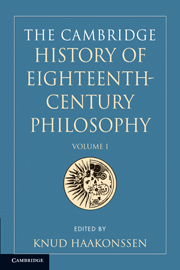Book contents
- Frontmatter
- CONTENTS
- Preface
- Methods of reference and abbreviations
- List of contributors
- I The Concept of Eighteenth-Century Philosophy
- 1 The History of Eighteenth-Century Philosophy: History or Philosophy?
- 2 Concepts of Philosophy
- 3 Schools and Movements
- 4 The Institutionalisation of Philosophy in Continental Europe
- 5 The Curriculum in Britain, Ireland, and the Colonies
- 6 Informal Networks
- II The Science of Human Nature
- Biobibliographical Appendix
- Bibliography
- References
1 - The History of Eighteenth-Century Philosophy: History or Philosophy?
from I - The Concept of Eighteenth-Century Philosophy
Published online by Cambridge University Press: 28 March 2008
- Frontmatter
- CONTENTS
- Preface
- Methods of reference and abbreviations
- List of contributors
- I The Concept of Eighteenth-Century Philosophy
- 1 The History of Eighteenth-Century Philosophy: History or Philosophy?
- 2 Concepts of Philosophy
- 3 Schools and Movements
- 4 The Institutionalisation of Philosophy in Continental Europe
- 5 The Curriculum in Britain, Ireland, and the Colonies
- 6 Informal Networks
- II The Science of Human Nature
- Biobibliographical Appendix
- Bibliography
- References
Summary
The history of eighteenth-century philosophy is a subject with its own history. However, the idea of what constitutes eighteenth-century philosophy has been remarkably stable over the two centuries that have elapsed since the period in question, and this stability has obscured the simple fact of its historicity and made it peculiarly difficult to question the historical adequacy of that idea. What is more, even now, when detailed scholarship has undertaken such questioning in earnest, tradition is so strong that works of synthesis and overview – not to mention teaching – have to pay it considerable respect in order to find an identifiable audience.
During the last two centuries, two factors above all have lent the philosophy of the eighteenth century an identity, other than its place in time, and these two factors have often reinforced each other. One is the idea that the philosophy in question is the core of a wider cultural and social movement, namely ‘the Enlightenment’. The other is that the eighteenth century has to be seen as part of – in fact, as the high point of – a development of early-modern philosophy from Francis Bacon and René Descartes to Thomas Reid and Immanuel Kant.
THE ENLIGHTENMENT AND PHILOSOPHY
The attempt to identify the philosophy of the eighteenth century by means of the Enlightenment is as inadequate as it is popular. Apart from the danger of tautology – namely that the philosophy of the eighteenth century is the philosophy of the Enlightenment because the Enlightenment is the eighteenth century – the concept of Enlightenment is either too wide or too narrow to capture the philosophical riches of the century.
- Type
- Chapter
- Information
- Publisher: Cambridge University PressPrint publication year: 2006
References
- 7
- Cited by



